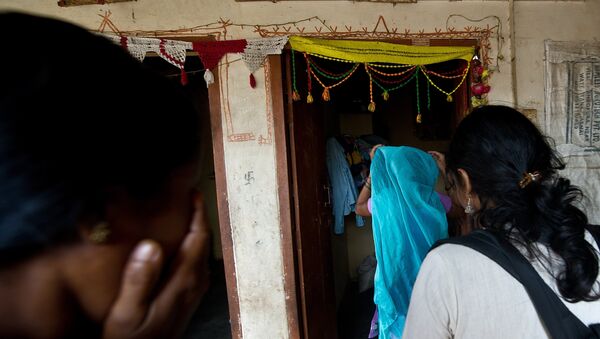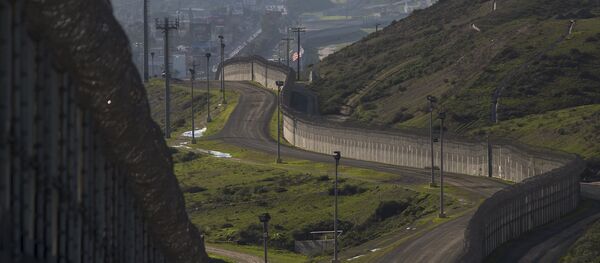New Delhi (Sputnik) — The district court of Gaya, in the eastern state of Bihar, found two brothel owners guilty of trafficking, rape and the sexual abuse of minors and convicted them under various sections of the Indian Penal Code (IPC), the Protection of Children from Sexual Offences Act (POCSO) and the Immoral Trafficking Prevention Act (ITPA). They were also levied a hefty monetary penalty. This is the maximum punishment under the existing anti-trafficking laws in the country.
Pancho Singh and his wife, Chhaya Devi, who ran a brothel in Bihar, were found guilty after evidence was provided by the girls, and given the maximum punishment under existing anti-trafficking laws. An additional district and sessions judge, Sachchidanand Singh, heard testimonies from four of the nine girls who were rescued from the brothel during a police raid in 2015.
READ MORE: Spanish Police Smash Sex Trafficking Gang Which Used Black Magic on Victims
One of the teenage victims was barely 11 years old when she was kidnapped and sold to the brothel. She had earlier played a key role in the arrest of an accused trafficker by identifying him. She narrated the horrifying details of how they were brutally forced to have sex with as many as 20 men per day. The court recognized the bravery the victims demonstrated by testifying and rewarded them with compensation of around $7,500 each and around $5,000 to the other girls who were kept with them.
NGOs working at the grassroots level claim that out of the millions of sex workers in the country, at least 80 percent are victims of trafficking.
"Conviction in a trafficking case is good news in India and an encouragement for the victims, their families, enforcing agencies and the organizations working in the field. In this particular conviction by the Gaya court, the role of the victims and their families is praiseworthy. The administration and the police stood by the victims to take this case to its logical conclusion," Shiney Anil, a child protection and care program officer with NGO Jovita, told Sputnik.
"However, the menace of trafficking in the flesh trade has always been prevalent, especially in the border areas of India. According to a 2015 National Crime Records Bureau report, a total number of 6,877 cases of crime relating to human trafficking were registered in India during that year; interestingly, this was an increase of 25.8% from the previous year. Notably, this was not the actual increase in the number of cases; it was the increase in the victims and families coming out in open and registering a complaint. So, there is increased confidence and this news of conviction is an additional encouragement for more victims to come out in the open," Pankaj Srivastava, a leading criminal lawyer in Delhi, told Sputnik.
READ MORE: 'Pedophile's Paradise': Sweden Softens Punishment for Serial Child Molesters
A senior public prosecutor who has been working in a special POCSO court in New Delhi says a lack of witnesses is the major deterrent to an early disposal of such cases.
"This conviction was achieved due to the brave testimony of the victims. In most of such cases, the witnesses either turn hostile or just can't be traced after being rescued. Although there is a provision for fast-track courts under the anti-trafficking laws victims still have to endure delays in the process and this becomes a deterrent to the delivery of justice. It's credible that this case was filed in 2015 and has been resolved in a matter of about two years," the public prosecutor told Sputnik on condition of anonymity.
Survivors are often unwilling and fearful of testifying. This problem can be addressed only by providing counseling and support to the rescued victims. This is another weak aspect of the existing anti-trafficking framework in India. The 2017 Trafficking in Persons (TIP) Report, which is published annually by the U.S. State Department, rates overall victim identification and protection in India as "inadequate and inconsistent." The report recommends that India must "improve its central and state government implementation of protection programs and compensation schemes to ensure trafficking victims receive benefits, release certificates, and compensation funds."
READ MORE: Skripal Poisoning: How PM May Diverts Public Attention Away From Child Sex Abuse
Earlier this year the Union Cabinet, chaired by Prime Minister Narendra Modi, approved the Trafficking of Persons (Prevention, Protection and Rehabilitation) Bill to be introduced in Parliament. This bill proposes more stringent norms and punishments including a rigorous 10 year to life jail term.
"Human trafficking is the only crime that finds a mention in the Constitution. Unfortunately, it was not described comprehensively till the Nirbhaya incident (a gruesome incident in December 2012 in Delhi, where a 23-year-old girl was gang-raped and brutally tortured in a moving bus) took place and the Criminal Law (Amendment) Act, 2013, was passed by the Parliament," said Amod Kanth, former special commissioner of Delhi Police.
Speaking at a seminar on sex trafficking on the subcontinent, Kanth said, "Forced flesh trade is the third biggest organized crime in the world, after drugs and arms."
"Our experience in the border areas of Uttar Pradesh and Bihar has been tough, as the porous borders and money clout of the agents and pimps makes things difficult. Traffickers exploit loopholes in the system and use forged documents and bribe complicit officers to evade persecution," Shiney Anil adds.
The harsh reality is that being rescued is not the end for victims. They are constantly under the fear of being penalized for illegal acts they have been forced to commit by traffickers. Their situation is worsened by the social stigma of sex work. For most victims, there is no road that leads home. Returning the victims to the same communities that allowed them to be trafficked in the first place puts them at risk of abuse and even re-trafficking.
The views expressed in this article are solely those of the speakers and do not necessarily reflect the official position of Sputnik.






